Army vets Low T risks and benefits from Testosterone therapy
Low testosterone (Low T) is a common condition that affects men, and army veterans are at an increased risk for this condition. Army Vets Low T risks can cause a variety of symptoms, including fatigue, decreased libido, and decreased muscle mass. Testosterone replacement therapy (TRT) is a treatment option for men with Low T, and it has been shown to be effective in improving symptoms and overall quality of life. In this blog, we will explore why army veterans are at risk for Low T and how TRT can help improve their health and wellbeing.Why Army Vets Low T Risks lead to Testosterone Therapy consideration
Army veterans are at an increased risk for Low T due to a variety of factors. One of the main reasons is exposure to stress and trauma during combat. The stress and trauma of combat can affect the hypothalamic-pituitary-gonadal (HPG) axis, which regulates the production of testosterone in the body. When the HPG axis is disrupted, it can lead to decreased testosterone levels. In addition to stress and trauma, other factors that can contribute to Low T in army veterans include:- Age: As men age, their testosterone levels naturally decrease peaking at 19 and declining 1-2% in the best of conditions. Army veterans who are older may have accelerated their decline through stressful service.
- Injuries: Army veterans who have suffered injuries, particularly to the testicles or TBI (traumatic brain injury), may experience decreased testosterone production.
- Medications: Certain medications, such as opioids and steroids, can decrease testosterone production.
- Obesity: Obesity is a risk factor for Low T, and many army veterans struggle with weight gain after leaving the military.
- Sleep apnea: Sleep apnea is common among army veterans, and it has been linked to decreased testosterone production.
Symptoms of Low T in Army Veterans
The symptoms of Low T in army veterans can vary depending on the severity of the condition. Some common Low T symptoms include that patients on TRT programs see improvements in:- Fatigue: Low T can cause fatigue and a lack of energy.
- Decreased libido: Army veterans with Low T may experience a decrease in sex drive.
- Decreased muscle mass: Low T can cause a loss of muscle mass and strength.
- Weight gain: Low T can cause weight gain, particularly around the midsection.
- Mood changes: Low T can cause mood swings, irritability, and depression.
- Erectile dysfunction: Low T can contribute to erectile dysfunction.
Benefits of Testosterone Replacement Therapy
TRT can be an effective treatment option for army veterans with Low T. Some of the potential benefits of TRT include:- Increased energy: TRT can help boost energy levels, reducing fatigue and improving overall quality of life.
- Improved libido: TRT can help increase sex drive and improve sexual function.
- Increased muscle mass: TRT can help increase muscle mass and strength.
- Weight loss: TRT can help promote weight loss, particularly around the midsection.
- Improved mood: TRT can help improve mood and reduce symptoms of depression and irritability.
- Improved bone density: TRT can help increase bone density, reducing the risk of osteoporosis.
Risks and Side Effects of Testosterone Replacement Therapy
While TRT can be an effective treatment option, it is not without risks and side effects. Some potential risks and side effects include:- Increased risk of blood clots: TRT can increase the risk of blood clots, which can be dangerous. Make sure your provider tests for and reviews Hematocrit levels.
- Acne: TRT can cause acne and other skin reactions.
- Breast tissue growth: TRT can cause breast tissue to grow in some men if Estradiol levels and the ratio of Total Testosterone : Estradiol is left un checked and not managed.
- Sleep apnea: TRT can worsen sleep apnea in some men
Army vets Low T risks and benefits from Testosterone therapy
sa_admin March 21st, 2023
Posted In: Uncategorized
Tags: benefits of testosterone, benefits to your body, depression, erectile dysfunction, fatigue, hormone replacement therapy, low t, testosterone levels, testosterone therapy
99 Simple Naturals Ways to Boost Testosterone – Part 3
This is the third part of our comprehensive list of:
99 Simple Natural Ways to Boost Testosterone.
Mercury Kills
Mercury is a horrific toxin that will absolutely crush your testosterone level, as well as cause any number of other health-related problems. Of course fresh fish (the fresher the better) should be an important part of your diet regimen, but buy or catch from unpolluted waters.
Peak 7 Heaven
Similar to a HIIT workout, the Peak 7 Method involves a simple warm-up, followed by high-intensity exercises (burpees, lunges, etc.) for 30 seconds then a 90 second cool down and rapidly repeat for 7 times, an excellent natural ways to boost testosterone level. In addition to being an excellent cardio workout and Testosterone Boost, this training system is also convenient to fit into any schedule.
Go Ahead and JUMP
The simple Old School action of jumping is proven to activate the lymphatic system which greatly benefits your testosterone levels as a result. So whether it’s jumping rope, hurdles or high bars, jump into a testosterone boost as a part of your cardio workout.
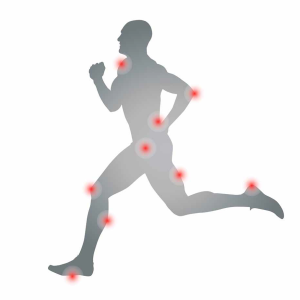 Flush the Fluoride
Flush the Fluoride
Fluoride is an iodine inhibitor (see #16) and an absolute testosterone killer. Iodine and fluoride are halogens and when introduced, harmful fluoride overcome helpful iodine and damages our endocrine system.
Everybody Out of the Pool
Another harmful halogen and iodine inhibitor, easily avoidable chlorine need never be an issue, unless you happen to be training with the US Olympic Swim/Diving Team.
Beat Bromine
Yet another harmful halogen, bromine is a carcinogen as well so be careful to keep bro-loaded foods (flours, non-organic produce and syrupy sodas that contain vegetable oil based bromine) and check your labels.
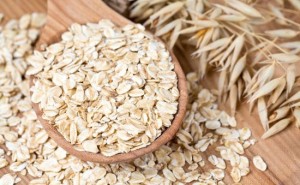 Feel the Fiber…in Moderation
Feel the Fiber…in Moderation
Fiber is a diet positive but high-fiber diets can actually lead to a decrease in your testosterone level and so should be avoided. You may also want to equalize your fiber intake with a roughly average amount of oats, which contain saponins and will balance out your fibrous intake.
Get Explosive Training
Low reps with Max weight (see #5) is one of the excellent natural ways to boost testosterone level, but adding explosive movements to your training (box jumps, tire lifts, sledgehammers, etc.) can also provide a reliable post-workout testosterone boost, as well as add to your core strength and overall power!
Balance Your Protein
When you’re packing in the good protein you’ll need, don’t forget to collect your carbs and good fats as well. A high protein diet is a necessity to maintain a healthy testosterone level, but you’ll need to balance your diet regimen as well.
Vegetarians Will NOT Inherit the Earth
The scientific facts are IN and the vegetarian way leads directly to a testosterone decrease…all the time and every time. Veggies are great, but meat is too. Everything in moderation!
Hit Home Runs
Whether your ball striking game is baseball, softball or golf, the primal action of smashing something with a stick can really add a spike to your testosterone level. So bust out your sledgehammers and axes and drivers and swing away!
 Slap Shot Hockey
Slap Shot Hockey
If you can skate your way onto a team, then the stick smacking action and roughhousing of the game of ice hockey (gym/field hockey also applies) will also be a testosterone goal.
Throw Away that Margarine
Let’s cut the scientific butter here and just state plainly that margarine is chemical garbage, an estrogenic dream and tastes horrible to boot. Throw it away forever if you haven’t already.
Let Your Balls Breathe
Every reliable study shows that the optimal testicular temperature is just a bit cooler than the rest of your body, so don’t pack the nuts too tight in those Speedos. And absolutely avoid hot baths (or baths altogether) and let your boys stay cool and do their important testosterone generating work.
Multi-Meal Diets are for Girls
Eating a number (say 5-6) smaller meals a day can be a healthy and fuel-efficient method of living, but this sensible practice can also lead to slightly lower testosterone and growth hormone levels. Consider sticking with your back loading carbs (see #31) and fasting (see #15) regimens instead.
Avoid Plastics (and all Chemicals in general)
All exposure to the vast majority of harmful chems floating everywhere today is health and testosterone negative because most act like estrogen when introduced to your system. Of course it’s virtually impossible to avoid them all but stop using plastics (and nuking Tupperware) and eat as organically as you can manage.
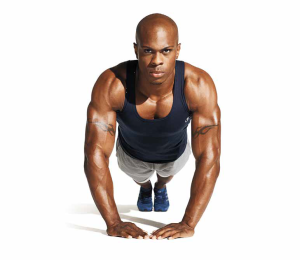 Break Your Physical Barriers
Break Your Physical Barriers
Train Smarter, not Harder, but occasionally you want to push through to the next level if and/or when your workout routine is beginning to plateau. This breakthrough will of course be absolutely based on your level as an individual, so use your best physical intuition here instead of relying on any set metric. Know your body and make it work!
Charge that Hill
Running best serves your testosterone increase when it’s explosive (see #58). Hill sprints in intervals are not only an awesome cardio workout, they’re a surefire spike for your testosterone levels as well. If you’re a flatlander then find the nearest multi-staircase and CHARGE!
Combat Sports are a Testosterone Rocket
You don’t need to be a barroom brawler to get your punches and kicks in. Any reputable boxing/MMA gym or Martial arts dojo will provide you with the supervised, and relatively safe, outlet you need to release your inner-monster without incurring the wrath of the Law. A solid combat training addition to your workout regimen is absolute testosterone gold.
Old-Fashioned Calisthenics Do the Testosterone Trick
Remember your old HS gym class warm-up (jumping jacks, running-in-place, bend-n-stretch, etc.)? Turns out calisthenics actually trigger a positive actions for your endocrine system, which in turn boost testosterone levels. So remember to give those jumping jacks your best!
Keep the Carbs Up
Yes, a high carb diet may lead to an insulin spike, which will cause a decrease in your testosterone production but not enough carbs will definitely lead to a lower level of testosterone. One of the best natural ways to boost testosterone level is to balance your carbs with your proteins and good fats for optimum testosterone maintenance.
Don’t Fiddle with Your Hormones
In certain cases (like hypogonadism), doctors may recommend Hormone Replacement Therapy (HRT). Be careful to only do so under the guidance of an expert physician.
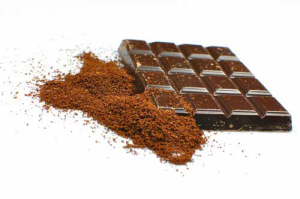 Raw Chocolate is OK
Raw Chocolate is OK
100% pure, organic chocolate (not the packaged, manufactured type) is loaded with anti-oxidants and a surprising amount of helpful minerals that lead to a healthy testosterone level. Of course, practice moderation when enjoying your chocolate treats.
Bee Pollen is a Testosterone Bomb
Pure bee pollen, much like pine pollen, actually contains raw testosterone and will absolutely boost Testosterone Level when taken as part of your diet regimen.
Add Vitamin K2
Vitamin K2 is an important, but often overlooked fat soluble nutrient that not only is a key to bone health but is a reliable testosterone booster as well. So don’t be afraid to get your egg yolks, chicken livers, hard cheeses and salami in you as well as any fermented foods such as kimchi or natto.
Hormone Therapeutics aims to help people looking to improve and optimize their health through natural means or through the guidance of our physicians.
Don’t miss out our free weekly tips and news on Low T, hormone balancing, healthy living, nutrition and a lot more.
Want more?

Sign up today and Get our ebook, ‘Naturally Increase Your Testosterone Levels’ absolutely FREE.
99 Simple Naturals Ways to Boost Testosterone – Part 3
Saleamp Design December 16th, 2016
Posted In: Health & Wellness
Tags: bee pollen, boost testosterone, bromine, chocolate, combat sports, fiber, hormone replacement therapy, ice hockey, mercury, natural ways to boost testosterone, protein, testosterone production, Vitamin K
Aromatase inhibitor benefits and side effects as part of Testosterone Therapy
Any significant research into TRT will likely also discuss aromatase inhibitor and estrogen management. You will definitely find this on the ‘Bro-Science’ bodybuilding sites focusing on bulking and supraphysiological dosages of testosterone and other anabolic-androgenic steroids that aromatize to estrogen and estradiol.
What is an aromatase inhibitor and what does it do?
Aromatase is the enzyme complex that converts androgens like testosterone into estradiol in men. Weight gain and aging increase the risk for testosterone conversion into estradiol. Estradiol is the “bad estrogen”, responsible for issues including (often) prostate issues, gynocomastia and erectile/libido/hormonal problems. Men find aromotase in their fat cells and as they expand our estradiol will find itself increasing at the same time our testosterone levels dwindle.
An aromatase inhibitors binds to aromatase, disabling it.
Why take an aromatase inhibitor?
AIs will reduce Estradiol levels. Symptoms of high estradiol include gynecomastia (male breast development and enlargement) and edema (fluid retention in the extremities).
Avoid or Reverse Gynecomastia – Estradiol plays a major role in gynocomastia and an AI like Arimidex (anastrozole) – occasionally letrozole is used – is quite effective in managing estradiol levels. The most important thing is to blood test and measure the estradiol levels and look at is on it’s own and as a % of Total Testosterone levels. if a man goes over a total testosterone of about 600 ng/dl, he will very likely need an aromatase inhibitor. The symptoms for elevated estradiol can mimic those for low testosterone, including mood issues, low libido, erectile dysfunction and other estrogenic side effects.

Did you really want to see a before pic?
Clinical research has looked into the use of aromatase inhibitors as an option to testosterone replacement in older men, and to delay bone closure in adolescent boys who are short, to allow them to gain more height.
Is Estradiol important? Role in men of Estradiol:
Since Estradiol is known as a female hormone and elevated levels can cause gynecomastia or edema, many men believe they need to eliminate or suppress it. This is not true, the body produces estrogens in men because we need it.
Estradiol is important in determining bone mineral density in men. Low levels may lead to bone loss and osteoporosis in elderly men. Low estradiol levels increase fat and decrease sex drive and erectile function.
We do not know the optimal estreadiol range but do know that low levels are not good. We also believe taking anastrozole without clinically diagnosed high estradiol levels and symptoms (gynecomastia and edema) can be counterproductive for men on testosterone therapy. Get your advice from a trained HRT/TRT physician and not someone in the gym or a “Bro-science” website.
Potential side effects of Aromatase inhibitors
Aromatase deficiency has been linked to increased insulin resistance, which is a precursor to type 2 diabetes. Animal studies have shown that an absence of aromatase in male rats increases insulin resistance as well as body fat, and “fatty liver” develops. When young, healthy men were given an aromatase inhibitor, they developed slightly increased body fat, particularly within the waist (i.e., intra-abdominal fat). This type of fat is associated with the development of metabolic syndrome, which includes insulin resistance.
Patients with low testosterone should be wary of automatically using aromatase inhibitors, due to a number of potential metabolic effects. For the AAS using bodybuilder, aromatase inhibitors can be necessary to combat aromatization from supraphysiologic testosterone and other AAS dosages. The most important thing is to work under the guidance of a trained HRT/TRT physician and get tested regularly.
Aromatase inhibitor benefits and side effects as part of Testosterone Therapy
Saleamp Design September 13th, 2016
Posted In: Low T Info
Tags: aromatase, benefits to your body, erectile dysfunction, estradiol, estrogen, hormone replacement therapy, hypogonadism, low t, low testosterone, sex drive, testosterone
Testosterone Levels’ Link to General Health in Men
 A study has shown that serum testosterone concentration in men may have links to fitness and health levels that can serve as an indicator of general health. These studies are exploring how testosterone content may affect all-cause mortality in older men and what it may mean for men as they age.
A study has shown that serum testosterone concentration in men may have links to fitness and health levels that can serve as an indicator of general health. These studies are exploring how testosterone content may affect all-cause mortality in older men and what it may mean for men as they age.
Testosterone Concentration in Men
Testosterone (T) is a hormone produced by males in the testicles after a communication pathway called the HPA axis from the hypothalamus to the pituitary gland through the adrenals and to the gonads. While it is also present by women, it is produced in much higher concentrations in men. It is responsible for maintaining energy, bone density, muscles mass, sperm production and sex drive, along with other traits, and is associated with maintaining many of the characteristics associated with men.
The level of T concentration in men peaks and declines at given points in their lifetime. In general, serum T concentration is highest in adolescence and young adulthood, when it is at its peak. However, as men age, its levels commonly undergo a steady decline. Men peak at age and experience a range of one to two percent decline in their concentration.
Testosterone levels and their links to health
Scientists have been exploring possible links of testosterone as an indicator of men’s health conditions, studying the correlation of low T with general health and mortality.
One study has discovered that while a decline in men’s T levels of one to two percent is considered normal, a sudden and immediate drop in testosterone concentration may be associated with an increased probability of mortality. Based on observations, a low level of serum testosterone concentration in men is seen as associated with risk factors such as diabetes and cardiovascular problems. However, while these conditions may be associated with illnesses and premature death, the FDA is not saying they see a direct causational effect between decreasing testosterone and longevity.
Scientific Testosterone Studies
Currently, available studies tackling the topic have produced mixed results. In one study researching a sample of 794 men, it was concluded that men whose testosterone levels were in the lowest quartile of test subjects were at a 40% greater risk of mortality in comparison to those men who had higher levels. A 15 year study of US military veterans also showed that men with low T levels, treated under physician guidance and supplemented back to normal levels above 500, had lower incidence of heart attack, stroke, prostate cancer and death.
In an effort to consolidate all the data and results from these previous researches, a newer study examined multiple works from 1966 to 2010 in order to gain a clearer and more definitive understanding of testosterone levels and mortality. In addition to testosterone levels, it also took into account lifestyle factors, age and other characteristics that may affect results.
Low Testosterone and Higher Mortality or Cardiovascular Risk
Ultimately, the research concluded that a decline in total testosterone was linked with cardiovascular mortality by 25% and with higher susceptibility to general, all-cause mortality by 35%.
The study did note that other factors may influence the relative risk that was determined in the study. Among these, researchers noted the age of the population studied, the total testosterone level and the amount of years the patient followed up as possible sources of differences within the study. The study also observed the most susceptible demographics for larger relative risks. These included patients with lower levels of testosterone, older men and patients who followed up for a smaller amount of years.
As a conclusion, the data gathered from this research establishes low T as a possible basis or indicator of general health in men. However, while it may be seen as a marker of higher susceptibility to all-cause mortality, it is not strictly a direct source of it. Overall, there remains much to be learned about the two.
Hormone Therapeutics
Aside from being and indicator of one’s general well-being, testosterone levels and hormone balance are traits that can greatly affect one’s quality of life. As men age, it becomes important to monitor these factors in order to gain a better idea of one’s health and fitness.
Hormone Therapeutics specializes in assisting people with endocrine-related concerns in order to help them monitor and regulate the level of hormones in their bodies. If you have any inquiries regarding your testosterone level and what it means for you, Hormone Therapeutics can help you jumpstart your life and provide you with the answers you need.
Testosterone Levels’ Link to General Health in Men
Saleamp Design April 12th, 2016
Posted In: Testosterone Therapy
Tags: adrenals, bone density, cardiovascular, energy, health, hormone replacement therapy, HPA axis, hypothalamus, low t, low testosterone, mortality, muscles mass, pituitary glands, sex drive, sperm, testosterone, testosterone therapy
Revealed: How Testosterone Converts to Estrogen to Battle Depression
 A recent study at the George Washington University, found that men diagnosed with borderline low testosterone levels had much higher rates of experiencing depression and depressive symptoms compared to the general population. In the study, 56% of the male participants were diagnosed with depression while 25% were already taking medications for this.
A recent study at the George Washington University, found that men diagnosed with borderline low testosterone levels had much higher rates of experiencing depression and depressive symptoms compared to the general population. In the study, 56% of the male participants were diagnosed with depression while 25% were already taking medications for this.
Produced in the testicles, testosterone helps drive a man’s production of sperm, muscle strength and mass, sex drive, facial and body hair and bone density. Men who don’t produce the normal amount of testosterone may have a condition called hypogonadism.
To Ward off Depression, Testosterone Converts to Estrogen
Testosterone, the male sex hormone, seems to have anti-depressant like properties, yet the exact mechanism of its effect still remained unclear.
In 2012, Mohammed Kabbaj and Nicole Carrier, both researchers at the Florida State University College of Medicine, are working to elucidate such mechanisms. They have found out that a particular pathway called MAPK pathway in the hippocampal region, a part of the brain, involved in regulation of stress responses and memory formation, plays a vital role in mediating the effect of testosterone.
Low Testosterone and Depression
Between men and women, females are typically more prone to suffer from depression, however, men diagnosed with low T or hypogonadism are also predisposed to depression or anxiety. Fortunately, hormone replacement therapy has been found to effectively enhance mood.
While it may seem that much is already known, it’s still very important to fully understand where and how these effects are happening so that scientists can develop better, targeted antidepressant therapies.
In the study, Kabbaj performed several experiments in neutered male rats and found that the rats manifested depressive-like behaviors that were then reversed by supplemental testosterone replacement.
According to the researcher, in order to protect males with hypogonadism from developing depression, testosterone in the brain must be converted to estrogen. Kabbaj stated a certain brain enzyme ‘mediates’ the conversion of testosterone to estrogen. Furthermore, inhibiting such enzyme in the hippocampal area has prevented the antidepressant effect of testosterone. This makes the conversion to estrogen vital.
In this study, the antidepressant effect of supplementing low testosterone to normal levels has only manifested in male rats, not in female rats.
Do You Need Help?
Hormone Therapeutics is the leading national company assisting men who want to get their lives back through Hormone Replacement and Testosterone Replacement therapy. Our local physicians are ready to treat you anywhere in the entire country. Hormone Therapeutics is pioneering an easier, cost efficient and more private way for you to work with our clinical advisors and physicians from the privacy of your home or office after your local physical exam confirms you have one of the symptoms of Low T.
Contact us today and our clinical advisors will work with you on a hormone therapy program that may include prescribed hormones, exercise, nutrition and sleep programs to reclaim your vitality.
Revealed: How Testosterone Converts to Estrogen to Battle Depression
Saleamp Design March 29th, 2016
Posted In: Low T Info
Tags: antidepressant, bone density, depression, hair loss, hormone replacement therapy, hypogonadism, low t, muscle strength and mass, sadness, sex drive, sex hormone, sperm, testosterone, testosterone levels
Here’s How Sermorelin Can Help Increase Your Brain Performance
We all age. It is inevitable. It is part of life. Sermorelin can help.
Yet most of us wish to keep a highest quality of life as we age – a life where we can still keep as much of the strength, energy and appearance that we enjoy in our youth. Likewise, we hope to be spared the damage that comes with degenerative diseases. Hormones highly affects our vitality and longevity – an important key to our ability to look and feel young.
As we age, hormone levels change and evolve. The energy-producing, fat-burning hormones fall while the energy-depleting, fat-storing hormones will inversely rise. Such changes makes us feel and look older.
Sometimes, hormones severely drops into a deficiency, below the level that can maintain the best health outcomes. In this situation, hormone optimization– through exercise, sleep, diet, lifestyle changes and hormone therapy – can be very beneficial to one.
Human growth hormone is one of the most common, and important, body hormones that usually drops to deficiency level.
What is Adult Human Growth Hormone Deficiency?
Adult growth hormone deficiency (AGHD) is being recognized increasingly. It has been associated with cardiovascular, metabolic, neuromuscular, neuropsychiatric-cognitive and skeletal abnormalities.
Symptoms include:
- Changes in memory, processing speed and attention
- Lack of well-being
- Depression
- Anxiety
- Social isolation
- Fatigue
- Lack of strength
- Fibromyalgia syndrome
- Neuromuscular dysfunction
- Decreased muscle mass
- Decreased bone density
- Impaired cardiac function
- Decreased insulin sensitivity
- Increased buildup of abnormal fat masses in the blood vessel walls
- Increased low-density lipoprotein or bad cholesterol
- Decreased sweating and thermoregulation
Most of these symptoms can be reversed through growth hormone therapy. Adult Growth Hormone Deficiency must be diagnosed before a physician can legally prescribe HGH to a patient.
How Sermorelin Helps Adult Growth Hormone Deficiency
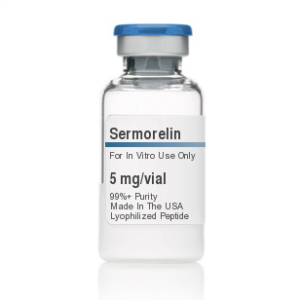
Sermorelin Acetate (GRF 1-29) is a bio-identical growth hormone-releasing hormone that can be used to safely stimulate the production of growth hormone from the pituitary gland. An FDA-approved medication, it has been genetically engineered to increase the levels of growth hormone and reverse the effects of AGHD.
Sermorelin acetate was first developed in the 1970s, and was considered to be the shortest, yet fully functional piece of GHRH, that has been used to test for human growth hormone secretion.
Sermorelin has been used as a hormone replacement therapy for testosterone in men and an anti-aging product. Unlike human growth hormone, Sermorelin is a secretagogue, which means it stimulate the gland to secrete hormone.
How Sermorelin Help Improve Your Brain Function
The effect of growth hormone-releasing hormone is better observed among patients who secrete little to zero growth hormone due to pituitary tumors or the total removal of the gland where human growth hormone is produced.
Regardless of the age, all patients manifest similar psychological effects due to growth hormone deficiency. Symptoms include mood swings, anxiety, increased social isolation, decreased work capacity and depression (Ronald Klatz, Robert Goldman, Stopping the Clock, 2003).
GHRH has also been found to have positive effect on patients with mild cognitive impairment. In a study by the University of Washington School of Medicine (2013), thirty adults (17 diagnosed with mild cognitive impairment) ranging in age between 55 and 87 years participated in a study on the neurochemical effects of GHRH.
After 20 weeks of GHRH administration, results showed an increase in gamma-Aminobutyric acid (GABA) and N-acetylaspartylglutamate (NAAG), and a decrease in myo-inositol (MI), which are positive indicators that may help reverse age-related decline and improve cognitive function.
Do You Need Help?
Hormone Therapeutics is the leading national company assisting men who want to get their lives back through Hormone Replacement and Testosterone Replacement therapy. Our local physicians are ready to treat you anywhere in the entire country. Hormone Therapeutics is pioneering an easier, cost efficient and more private way for you to work with our clinical advisors and physicians from the privacy of your home or office after your local physical exam confirms you have one of the symptoms of Low T.
Contact us today and our clinical advisors will work with you on a hormone therapy program that may include prescribed hormones, exercise, nutrition and sleep programs to reclaim your vitality.
Here’s How Sermorelin Can Help Increase Your Brain Performance
Saleamp Design March 20th, 2016
Posted In: Health & Wellness
Tags: anti-aging product, brain function, cognitive skills, depression, fatigue, GHRH, growth hormone therapy, growth hormone-releasing hormone, HGH, hormone replacement therapy, hormone therapy, human growth hormone, memory, Sermorelin
Telemedicine testosterone therapy guidance
Hormone Therapeutics created a national telemedicine platform to bring world class Testosterone and Hormone Replacement Therapy physicians right to your home. Get an expert specialist physician to provide testosterone telemedicine guidance at home. Telemedicine testosterone therapy allows us to help patients wherever they live as we have designed a separate program for each state to work with our locally licensed physicians and pass all of the national and state wide regulations of which there are a lot.
Telemedicine Testosterone Therapy
Here, Hunter Howard discusses his history in healthcare as well as the increase of telemedicine access in the evolving US healthcare system. The key is how Hormone Therapeutics reduces weekly office visits for shots but maintains the same high standard of care and even increases it in many cases. Telemedicine testosterone therapy allows patients to reach our specialist from home, set up local blood tests, schedule a local physical exam and start on a program where the treatments are mailed directly to the patient and consultations are available anytime the patient needs guidance. We are available anywhere and anytime.
Listen to the Podcast
Learn more about our innovative approach to delivering patient care. We discuss this in the 20 minute podcast link below. We also discuss the development of digital health and virtual visits to help healthcare catch up with the the evolution so many other industries have experienced. The benefit goes to the consumer with patient-centric care. This is what drove our vision to help improve the lives of patients anywhere. These patients are paying too much to anti-aging specialists in vanity palace facilities in cities like Miami, LA and Dallas. We are even more excited to bring a solution to cities like Topeka and Springfield. In these cities the only possible solution is going to a primary care physician, who is rarely trained in hormone optimization. Thees physicians can only prescribe the low dose, one size fits all Androgel or Axiron. These low does gels are rarely effective for most patients. We are excited to help men live healthier and more productive lives. Our solution is lower cost, easier, more convenient and more private solution
Telemedicine testosterone therapy guidance
Saleamp Design January 15th, 2016
Posted In: Low T Info, Telemedicine, Testosterone Therapy
Tags: anti-aging, benefits of testosterone, Hormone Replacement physician, hormone replacement therapy, low t, low testosterone, telemedicine, Telemedicine Testosterone Therapy, testosterone physician, testosterone therapy
Female sexual desire treatment approved by FDA
The FDA approved a new treatment for women with sexual desire disorder, medically known as Hypo-Active Sexual Desire Disorder (HSDD). The pill, nicknamed the Female Viagra, will only be available through healthcare providers. HSDD is characterized through low sexual preference that reasons marked distress or interpersonal issue and isn’t due to a co-existing medical or psychiatric situation, troubles inside the courting, or the effects of a medication or other drug substance. HSDD is received while it develops in a patient who formerly had no troubles with sexual desire. HSDD is generalized when it occurs irrespective of the sort of sexual hobby, the state of affairs or the sexual accomplice. This female sexual desire treatment had been under scrutiny for many years prior by the FDA due to the number of side effect by its previous male version of the drug; but which is now irrelevant.
Here is the press release by the FDA:
http://www.fda.gov/NewsEvents/Newsroom/PressAnnouncements/ucm458734.htm?source=govdelivery&utm_medium=email&utm_source=govdelivery
Female sexual desire treatment approved by FDA
Saleamp Design August 20th, 2015
Posted In: Health & Wellness, Low T Info, Testosterone Therapy
Tags: benefits to your body, female viagra, Hormone Replacement physician, hormone replacement therapy, hormone therapy, libido, quality of life, sexual desire, sexual performance, Viagra
Testosterone Benefits Cardio Issues in Veterans Pending New Research
A new study, utilizing research data from Veteran Affairs showed that veterans utilizing testosterone replacement therapy had less chance of suffering from heart attack, stroke, or death compared than veterans who were not on testosterone treatment. The study examined over 83,000 veterans who were diagnosed with low testosterone by the Veterans Affair Medical Center over a 15 year period from 1999 to 2014.
One of the key aspects to healthier outcomes was testosterone therapy that returned the veteran to normal testosterone levels v. higher and supra-physiological levels of testosterone supplementation
Here is a link to an article about the study in Science Times:
http://www.sciencetimes.com/articles/7093/20150813/testosterone-replacement-could-benefit-veterans-cardiovascular-health-study-shows.htm
Testosterone Benefits Cardio Issues in Veterans Pending New Research
Saleamp Design August 20th, 2015
Posted In: Health & Wellness, Low T Info, Testosterone Therapy
Tags: benefits of testosterone, benefits to your body, cardiovascular disease, cardiovascular health, cardiovascular risk, heart disease, hormone replacement therapy, low t, low testosterone, low testosterone levels, myocardial infarction, t therapy, Testosterone replacement therapy, testosterone therapy, Total Testosterone
Testosterone Therapy Study Shows an Increase in Longevity
New studies are coming out showing the benefits of Testosterone Therapy bringing men back to normal testosterone levels are improving life expectancy in men and decreasing their risks for heart attack or stroke. The key finding in this study co-authored by a researchers at the University of Kansas and in India was that the patients testosterone levels were supplemented adequately to reach normal levels.
Learn more about this August 2015 study here:
Testosterone Therapy Study Shows an Increase in Longevity
Saleamp Design August 18th, 2015
Posted In: Health & Wellness, Low T Info, Testosterone Therapy
Tags: anti-aging, benefits of testosterone, benefits to your body, cardiovascular, cardiovascular disease, cardiovascular health, cardiovascular risk, decreased cardiac risk, decreased heart risk, Hormone Replacement physician, hormone replacement therapy, Improved health, increased longevity, life expectancy, longevity, low testosterone, low testosterone levels, lower cardiovascular risk, lower health risks, myocardial infarction, quality of life, Testosterone replacement therapy, testosterone therapy


